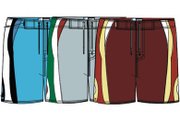Midwestern Off-Price Company Takes Swing at Surf Market
Is the surf-and-skate industry a “localsonly” zone?
Bermo Enterprises Inc., the largest offprice specialist in the Midwest, will find out when it introduces its Laguna Sportswear line at the Action Sports Retailer Trade Expo, the hardcore surf industry show running Sept. 9–11 in San Diego.
Laguna Sportswear is the first licensed line by Bermo. Surf industry veterans may remember it as a leading swimwear line that launched in California in the 1950s, but the brand was dormant during the past decade.
Industry insiders may not know of Bermo, however. The 32-year-old private company rose to success in the off-price arena, not in the surf-and-skate market, which has been a standard bearer for Southern California cool and higher price points.
Bermo, based in Schoolcraft, Mich., just outside of landlocked Kalamazoo, operates as a wholesaler of popular-priced clothes and as a retailer. The company runs 33 stores, most of them in the Midwest.
Bermo’s Laguna Sportswear, which debuted last year, is sold at Macy’s East and Macy’s West, according to Al Katz, the label’s national sales manager. He said he hopes to interest specialty shop owners in the line and perhaps sell it to a surf-friendly national retail chain such as Tilly’s or Pacific Sunwear of California Inc. He forecasted sales of $30 million in 2006 and said his company is not trying to reinvent the wheel.
“It’s similar to Op,” Katz said, referring to Irvine, Calif.–based Ocean Pacific Apparel Corp.’s reemergence on the surf market in 1997. “Bermo took a dormant label and resurrected it. But we give the consumer an advantageous price compared to other surf brands. We got similar styling and similar quality under $40.”
But Bermo might be wasting its time, said Roy Turner, president of the Board Retailers Association, based in Wilmington, N.C.
“It’s mission impossible,” Turner said. “I hate that it’s become that way. I think there needs to be new blood in this industry.”
Ninety percent of the floor space of specialty surf shops is dedicated to the few brands that have dominated the surf industry for the past 20 years—including Quiksilver, Billabong, O’Neill, Hurley and Rip Curl—according to Turner. These companies’ retail relations give little reason for specialty stores to stray. “They’re merchandising correctly. Their sellthrough is great. Why order anything new on the menu?” Turner said.
But new brands such as Costa Mesa, Calif.–based RVCA have captured the imagination of surfers and skaters and have been embraced by the industry. RVCA won the Surf Industry Manufacturers Association 2005 Image Award for Buzz Brand of the Year.
Bermo hopes to gain fashion acceptance in the surf world with the retro looks of Laguna Sportswear. Susan Reilly, the chief merchant of the label, has updated an estimated 70 percent of the line. Reilly made the inseams of the boardshorts longer, for example, to jibe with current boardshort styles, which place inseams just below the knees. Reilly also worked with Bermo’s Outback Rider sportswear label.
Laguna’s Spring 2006 collection is composed of men’s clothes; it features boardshorts, casual pants, walking shorts, denim shorts and jeans, T-shirts, woven shirts, and knits. Laguna’s long-sleeved knit shirt ($38 retail), called “PCH” after California’s Pacific Coast Highway, features a denim collar and comes in khaki, black and brown. The label’s “Shredder” boardshort ($36 retail) showcases a side zipper and comes in blue, charcoal and orange.
Laguna Sportswear was a leading swim and activewear line first produced in California in 1955 just as the surf industry was taking its baby steps. The label experienced popularity in the 1980s, when its volleyball shorts were a common sight on surfing beaches.
Ron Josephs, president of Woodland Hills, Calif.–based R. Josephs Sportswear Inc., purchased the license to the brand in the late 1980s. Kneat Knits, a New York–based popular-price knitwear company produced a juniors line for Laguna Sportswear in the early 1990s. Josephs sold the license to Ed Bernard, president of Bermo Enterprises, last year.
Bermo purchased the line because the company believes the surf-and-skate industry offers good growth opportunities, according to Katz, who declined to state how much it paid for the license.
ASR is a logical place to break into the skate-and-surf industry.
“You have to jump in the ocean to give it a try,” Turner said. “You can’t jump into the ocean at MAGIC Marketplace in Las Vegas.”






















